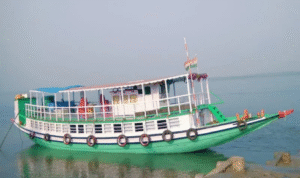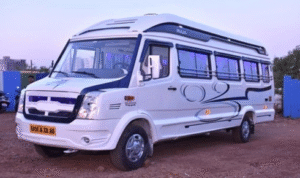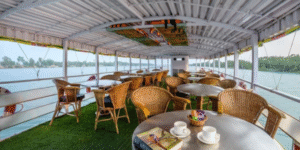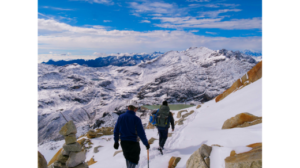1. Why is it necessary to manage travel finances?
Answer: Managing travel finances ensures you stay within budget, avoid unnecessary debt, and maximize the enjoyment of your trip. It helps you plan better, make informed decisions, and prevent financial stress while traveling.
2. How do I make a travel budget?
Answer: Start by estimating costs for transportation, accommodation, meals, activities, and unexpected expenses. Research your destination to get a sense of local prices, and set aside funds for emergencies or discretionary spending.
3. What are the best ways to save money for travel?
Answer: Open a separate savings account, and automate the monthly contribution. Cut back on unnecessary purchases. Consider using reward points, cashback offers, or discounts from travel apps. You can also travel off-peak or find deals on flights and hotel bookings.
4. Should I use a travel credit card for my trip?
Answer: Yes, with the travel credit card comes rewards such as points or miles for purchases, travel insurance, and no foreign transaction fees. Pay in full and avoid high interest charges.
5. How can I avoid foreign transaction fees?
Answer: Select a credit card with no foreign transaction fees. Some debit cards have this advantage as well. Otherwise, always use local currency or purchase money at higher rates before embarking on the trip.
6. Is it better to change money in advance or when one arrives?
Answer: It depends on your destination and available exchange rates. Often, it’s better to exchange a small amount in advance for initial expenses, then use ATMs or exchange services upon arrival for better rates.
7. How can I keep track of my travel expenses?
Answer: Track expenses in real time using budgeting apps or spreadsheets. Most apps allow you to enter expenses as you go, keeping you on top of your budget. You can also keep paper receipts for a more detailed record.
8. How do you budget while traveling?
Answer: Major expenses like accommodation and transport should be given top priority, while food and activities can be reduced in cost. Impulse purchases should be avoided, public transport should be used, and free or low-cost activities should be sought. Daily spending limits should be set.
9. Cash or cards during the trip?
Answer: A mix of cash and cards is recommended. Cards are a convenient form of payment, but some places might not accept them. Cash is extremely useful when going to small towns or visiting locations where the usage of credit cards is low.
10. How much cash do I take along on a trip?
Answer: Bring enough cash for initial expenses like transportation, tips, or meals, but avoid carrying large sums. A general rule is to carry 10-20% of your trip’s budget in cash and use a credit/debit card for most other expenses.
11. What’s the best way to handle money in different countries?
Answer: Use a combination of local currency, credit/debit cards, and travel-friendly cards without foreign transaction fees. Be informed about local banking practices-availability of ATMs; exchange rates; maximum amount that can be withdrawn.
12. How can I avoid ATM withdrawal fees?
Answer: Use ATMs that belong to your bank’s network or those offering low fees for foreign withdrawals. Some banks also reimburse ATM fees, so check with your bank before your trip. Avoid using ATMs in tourist areas where fees may be higher.
13. How do I deal with currency fluctuations?
Answer: Keep yourself updated on exchange rates and perhaps use a currency exchange service with competitive rates. You may also use applications that help monitor and compare the exchange rates, or convert your money in advance if the rates are favorable.
14. Should I get travel insurance?
Answer: Yes, travel insurance will protect you from unexpected problems such as cancelled flights, lost luggage, medical emergencies, or trip interruptions. It’s a small upfront cost that could save you a lot if something goes wrong.
15. How do I find the best travel deals?
Answer: Compare website such as Skyscanner, Google Flights, and receive price alerts about the best airfares, accommodation on different platforms like Booking.com, Airbnb, or Hostelworld; follow travel deals sites and travel pages on the social media in order to look for promotions.
16. In case I have lost my wallet, credit cards or any other sensitive documents abroad
Answer: Dial your bank and credit card issuer right away and inform them that your cards have been stolen. Place a copy of your passport and credit card info in a secure place. For emergencies, you can also obtain emergency funds at the local consulate.
17. How can I save money on accommodations?
Answer: Consider alternatives like hostels, guesthouses, vacation rentals, or Airbnb. If staying in hotels, book well in advance to secure discounts. You can also look for last-minute deals or use loyalty programs to earn points for future stays.
18. Should I book tours or explore on my own?
Answer: It depends on the destination and your comfort level. Booking tours can be convenient and offer local insights, but exploring independently allows for greater flexibility. Compare costs and research free or low-cost attractions.
19. How do I save money on food while traveling?
Answer: Instead of eating in the expensive restaurants, try the local food stalls or street food. Consider staying in accommodation that has kitchen facilities, and you can prepare some of your meals. Preparing meals in local markets can also be another inexpensive way to cook.
20. How can one save money on transportation?
Answer: Use public transport, walk, or rent bikes to get around. For long-distance travel, look for budget airlines, discounted tickets, or travel passes. Booking transportation in advance or during off-peak hours can also reduce costs.
21. How can I avoid overspending on shopping while traveling?
Answer: Set a shopping budget before your trip and stick to it. Avoid impulse buying by being selective about souvenirs or local products. Research local markets where prices may be lower, and always haggle when appropriate in certain countries.
22. What are some common travel scams I should avoid?
Be aware of overpriced transportation, spurious guides or fake merchandise. Do not distribute personal data or monies to unexpected people. Prior to arrival familiarize yourself with the scams targeting visitors and guard your purse at all times.
23. How would you avoid steep fees in pay for your journey?
Answer: Use credit cards that have no foreign transaction fees. For large expenses, use bank transfers or services such as TransferWise for low-fee international transfers. Avoid using airport currency exchange services, which often charge high fees.
24. What is a prepaid travel card, and should I use one?
Answer: A prepaid travel card is a prepaid debit card loaded with foreign currency for use while traveling. It’s safer than carrying cash and can help you manage your travel expenses. Look for cards that offer low withdrawal fees and good exchange rates.
25. How can I manage travel finances on a long-term trip?
Answer: Plan your finances ahead of time by setting a monthly budget, tracking expenses, and having available emergency funds. Online banking can be helpful as well as the ability to have automatic bill payments set up while abroad and have multiple payment options.
26. How do I know if I’m overspending while traveling?
Answer: Monitor your daily expenditure and compare this with your budget. If you are close to the end of your trip and you do not have enough money, you should cut on discretionary spending or find cheaper accommodations and activities.
27. Do I need to bring traveler’s checks?
Answer: Traveler’s checks are becoming less common, and many places no longer accept them. It’s generally easier and safer to use debit/credit cards or withdraw local currency from ATMs.
28. What is the best way to deal with taxes and tipping abroad?
Answer: Research local customs for tipping because it varies by country. Some include service charges while others expect tipping. Always verify your bill in case you will be double-paid.
29. How do you ensure that I have money on hand in the event of a crisis?
Answer: Have several ways of paying, such as a credit card, a debit card, and cash for emergencies. Make sure that you have online access to some money via an online bank or money transfer account.
30. What should I do if I’m out of cash while traveling?
Answer: Call your bank to have them set up emergency funds; ask family or friends to wire you money; or, if all else fails, services like Western Union or PayPal.
If you’re abroad, look into getting a loan or work for food or accommodations temporarily.
Having your travel finances in order allows you to travel without worrying about money, allowing you to relax and enjoy the experience.










Alright, alright, JILI22LoginApp, huh? That app is pretty clutch for quick access. No more fumble-fingering around with passwords. Download it, get logged in, and get playing. Seriously convenient! Get the app now: jili22loginapp